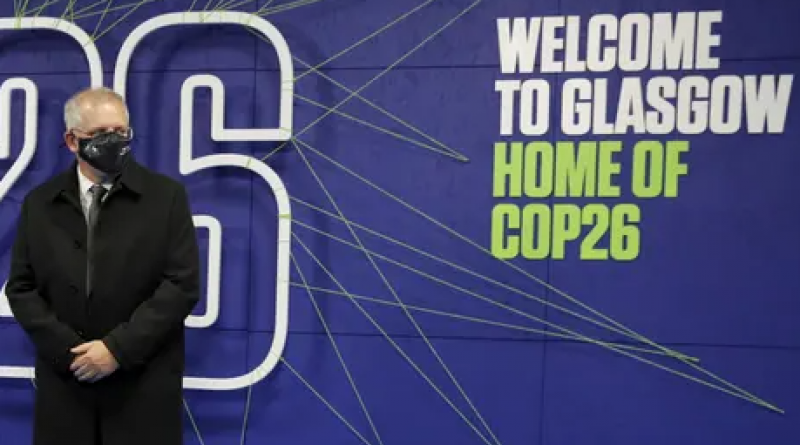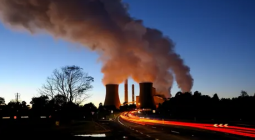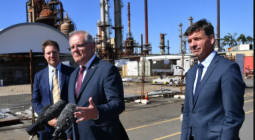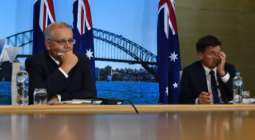French drama can’t hide real story from Cop26: Scott Morrison’s promise to do hardly anything

From a six-year-old emissions commitment to Boris Johnson’s non-binding breakthroughs, Australia’s lack of ambition was on full display.
There weren’t many silver linings for Scott Morrison in his extraordinary skirmish with Emmanuel Macron, but one may be that it has distracted public attention from the prime minister’s threadbare performance at the Glasgow climate summit.
As Morrison and other leaders flew home from the ongoing talks on Tuesday, observers were tallying up what the prime minister had committed to do at a meeting billed as the best, last chance to deal with the climate crisis. It didn’t take long.
Attention then turned to a more significant list: what the Australian government has not committed to doing.
At the top is one that we have known for a while: it made no commitment to cut greenhouse gas emissions rapidly, as scientific advice says is necessary.
This was the central point of the Glasgow summit – to ramp up action this decade, as was agreed under the ratchet mechanism of the Paris agreement. Countries are expected to lift their short-term commitments over time on the way to carbon neutrality.
The rule of thumb is that global emissions need to be cut roughly in half this decade. That means substantial action from all major emitters, particularly the wealthy. New commitments offered haven’t even come close to that, but they have increased over the past year.
The G7 developed nations and the European Union are all promising at least a 40% emissions cut by 2030 compared with (give or take) their highest polluting year. India, the world’s third-biggest emitter, this week promised that half its electricity would be renewable by then.
Even China, which drew strong and understandable condemnation from Joe Biden for president Xi Jinping’s non-appearance in Glasgow, offered a meagre increase on its 2030 pledges the week before the summit.
Australia didn’t manage that. Morrison went to Glasgow armed with the same short-term emissions reduction target (a 26-28% cut compared with 2005) set under Tony Abbott six years ago.
The prime minister was in the awkward position of having to tell the summit in his speech that the country would probably make a 35% emissions cut by 2030 – official government projections said so – but that he would not commit to doing it.
Morrison announced some new climate financing to help the least developed and most vulnerable, as wealthy nations have promised. The prime minister described it – and it was reported in some media – as a $2bn commitment. In reality there was only $500m additional funding spread over five years, making the new pledge $100m a year towards an annual global goal of US$100bn.
It was significantly less than what many comparable countries have offered. Morrison said Australia would continue to bypass the global Green Climate Fund and fund projects in the Indo-Pacific directly.
Beyond that, there were two set-piece pledges by national leaders that drew attention. Australia signed up to one and rejected the other.
The “yes” was to a declaration that global deforestation would be halted and reversed by 2030. Officials were slow to confirm Australia supported the initiative. Once they had, the assistant forestry minister, Jonno Duniam, was quick to say it would not require the country to stop native forest logging. The declaration’s main goal is to build support for protecting ecosystems in developing countries where vast areas are being felled for agriculture.
The “no’’ was to a global pledge to cut emissions of methane – a short-lived but incredibly potent greenhouse gas – by 30% by 2030. More than 80 countries signed up. Those who didn’t included China, India and Russia.
Meeting the methane goal would have required significant action to limit emissions from coalmines and gas fields – something the Morrison government has indicated it isn’t prepared to do. Instead, it muddied the waters, falsely claiming it would have required farmers to shoot their cattle.
Unsurprisingly, given its well-documented lack of ambition, Australia is not part of the high ambition coalition, which aims to limit global heating to 1.5C above pre-industrial levels – a goal that is supposed to be at the heart of the climate negotiations process.
It did sign up to the Glasgow breakthrough agenda, a collection of five goals launched by the British prime minister, Boris Johnson. These goals are technology focused – the Morrison government’s preferred territory – and vaguely defined, but a couple are worth noting.
One is that clean power will be the “most affordable and reliable option for all countries” by 2030. The important word here is “clean”, which the Morrison government usually defines as including gas, a fossil fuel.
Another is that zero emissions vehicles will become the “new normal” and “accessible, affordable and sustainable” in all regions in 2030. This is clearly at odds with the Coalition’s politically motivated “end the weekend” attack on electric vehicles before the 2019 election, but the government has been gradually inching away from that statement ever since (though not enough to give EV technology the support it receives in other countries).
A key point about the “breakthrough” goals is that none are binding, or specific enough to demand new policies. No one has to do anything.
Sound familiar? As the emissions reduction minister Angus Taylor put it on Tuesday, they “align strongly with Australia’s approach”.
3 November 2021
The Guardian




